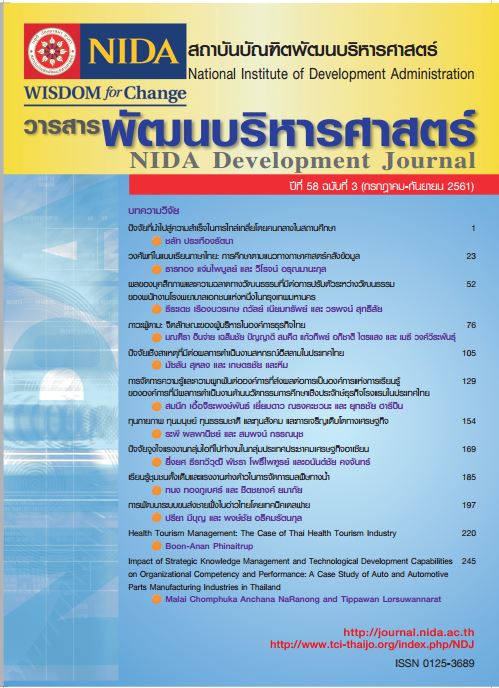The effect of Personality and Cultural Intelligence on Intercultural Adjustment of Employees in a Private Hospital in Bangkok.
Keywords:
five-factor model of personality, cultural intelligence, intercultural adjustmentAbstract
The objectives of this study were to study the influence of five-factor model of personality and cultural intelligence on intercultural adjustment of employees in private hospital in Bangkok. The samples of this study were 154 employees at a private hospital in Bangkok. The data were collected by questionnaire. The statistics used for data analysis were percentage, mean, standard deviation, and stepwise multiple regression analysis.
The results of this study showed that five-factor model of personality and cultural intelligence could jointly predict intercultural adjustment with both psychological adjustment and socio - cultural adjustment. (1) Neuroticism of personality and openness to experience of personality and motivational cultural intelligence could jointly predict psychological adjustment of employees in a private hospital around 30.3% at .001 level of significance. (2) Neuroticism of personality and motivational cultural intelligence and cognitive cultural intelligence could jointly predict socio - cultural adjustment of employees in a private hospital around 48.0% at .001 level of significance.
References
พวงรัตน์ ทวีรัตน์. (2540). วิธีการวิจัยทางพฤติกรรมศาสตร์และสังคมศาสตร์. (พิมพ์ครั้งที่ 7).กรุงเทพฯ: สำนักทดสอบทางการศึกษาและจิตวิทยามหาวิทยาลัยศรีนครินทรวิโรฒ.
ล้วน สายยศ และอังคณา สายยศ. (2543). การวัดด้านจิตพิสัย. กรุงเทพฯ: สำนักพิมพ์สุวีริยาสาส์น.
อภิญญา หิรัญวงษ์. (2551). เอกสารประกอบการสอนรายวิชา 01475511 (สถิติประยุกต์ทาง
จิตวิทยา). กรุงเทพฯ: มหาวิทยาลัยเกษตรศาสตร์.
Ali, A., Van der Zee, K. and Sanders, G. (2003). Determinants of intercultural adjustment among expatriate spouses. International Journal of Intercultural Relations, 27(5): 563-580.
Ang, S. & Dyne, L. V. (2008a). Conceptualization of cultural intelligence: Definition, distinctiveness, and momological network. In S. Ang, & L. V. Dyne. (Eds.). Handbook on Cultural Intelligence: Theory, Measurement and Applications (pp. 3-15). New York: M.E. Sharpe.
Ang, S. & Dyne, L. V. (Eds.). (2008b). Handbook on Cultural Intelligence: Theory, Measurement and Applications. New York: M.E. Sharpe.
Ang, S., Dyne, V. L., Koh, C., NG, K. Y., Templer, K., Tay, C., & Chandrasekar, N. (2007). Cultural intelligence: Its measurement and effects on cultural judgment and decision making, cultural adaptation, and task performance. Management and Organization Review, 3(3): 335-371.
Bhatti, M. A., Battour, M. M., Ismail, A. R., & Sundram, V. P. (2014). Effects of personality traits (big five) on expatriates adjustment and job performance. Equality, Diversity and Inclusion: An International Journal, 33(1): 73-96.
Cai, D. A. & Rodriguez, J. I. (1996). Adjusting to cultural differences: The intercultural adaptation model. Intercultural Communication Studies, 6(2):
31-42.
Cervone, D. & Pervin, L. A. (2009). Personality: Theory and Research (12th ed.). New York: John Wiley & Sons.
Costa, P. T. & McCrae, R. R. (1992). Discriminant validity of NEO-PIR facet scales.
Educational and Psychological Measurement, 52(1): 229-237.
Costa, P. T. & McCrae, R. R. (2003). Personality in Adulthood: A Five-Factor Theory Perspective (2nd ed.). New York: The Guilford Press.
Dyne, V. L., Ang, S., & Koh, C. (2008). Development and validation of the CQS: The cultural intelligence scale. In S. Ang, & L. V. Dyne. (Eds.). Handbook on Cultural Intelligence: Theory, Measurement and Applications (pp. 16-38). New York: M.E. Sharpe.
Huff, K. C., Song, P., & Gresch, E. B. (2014). Cultural intelligence, personality, and cross-cultural adjustment: A study of expatriates in Japan. International Journal of Intercultural Relations, 38(January): 151– 157.
Leung, K., & Li, F. (2008). Social axioms and cultural intelligence: Working across boundaries. In S. Ang, & L. V. Dyne. (Eds.), Handbook on Cultural intelligence: Theory, Measurement and Applications (pp. 332-341). New York: M.E. Sharpe.
Lin, Y.C., Chen, A. S.Y., & Song, Y.C. (2012). Does your intelligence help to survive in a foreign jungle? The effects of cultural intelligence and emotional intelligence on cross-cultural adjustment. International Journal of Intercultural Relations, 36(4): 541– 552.
Livermore, D. (2010). Leading with Cultural Intelligence: The New Secret to Success. New York: AMACOM.
Matsumoto, D., Hirayama, S., & LeRoux, J. A. (2006). Psychological skills related to intercultural adjustment. In P. T. P. Wong, & L. C. J. Wong. (Eds.). Handbook of Multicultural Perspectives on Stress and Coping (pp. 387-408). New York: Springer.
Matsumoto, D. (Ed.). (2009). The Cambridge Dictionary of Psychology. Cambridge: Cambridge University Press.
McCrae, R. R. & Antonio, T. (2005). Universal features of personality traits from the observer's perspective: Data from 50 cultures. Journal of Personality and Social Psychology, 88(3): 547-561.
McCrae, R. R., Costa, P. T., de Lima, M. P., Simoes, A., Ostendorf, F., Angleitner, A., Marusić, I., Bratko, D., Caprara, G. V., Barbaranelli, C., Chae, J. H. & Piedmont, R. L. (1999). Age differences in personality across the adult life span: Parallels in five cultures. Developmental Psychology, 35(2): 466-477.
Ramalu, S. S., Wei, C. C. & Rose, R. C. (2011). The effects of cultural intelligence on cross-cultural adjustment and job performance amongst expatriates in Malaysia. International Journal of Business and Social Science, 2(9): 59-71.
Thomas, D. C. (2006). Domain and development of cultural intelligence: The importance of mindfulness. Group and Organization Management, 31(1):
78–99.
Ward, C. & Kennedy, A. (1999). The measurement of sociocultural adaptation. International Journal of Intercultural Relations, 23(4): 659–677.
Ward, C., Leong, C. H. & Low, M. L. (2004). Personality and sojourner adjustment: An exploration of the “Big Five” and the “Cultural Fit” proposition. Journal of Cross-Cultural Psychology, 35(2): 137-151.
Wiese, D. L. (2013). Psychological health of expatriate spouses: A neglected factor in international relocation. Asian Journal of Counselling, 20(1&2): 1-31.
Translated Thai References
Hirunwong, Apinya. (2008). Lecture Notes for Course 01475511 (Applied Statistics for Psychology). Bangkok: Kasetsart University.
Panglilas, Nilobol. (2011). The Freedom of Professional Labor to ASEAN Market: Opportunity and Effect of Thailand. Bangkok: International Institute for Trade and Development.
Saiyot, Luan. & Saiyot, Angkhana. (2000). Assessment in Affective Domain. Bangkok: Suviriyasarn Printing House.
Thaweratana, Puangrat. (1997). Behavioral and Social Science Research Methods
(7th ed.). Bangkok: The Educational and Psychological Bureau, Srinakharinwirot University.
*หมายเหตุ ผลงานชิ้นนี้ได้เคยนำเสนอผลงานใน การประชุมวิชาการระดับชาติและระดับนานาชาติ "The 6th International Conference on Human Resource and Organization Management and Development 2015" ระหว่างวันที่ 9 - 11 กันยายน 2558 ณ สถาบันบัณฑิตพัฒนบริหารศาสตร์
Downloads
Published
How to Cite
Issue
Section
License

This work is licensed under a Creative Commons Attribution-NonCommercial-NoDerivatives 4.0 International License.





